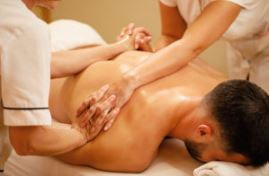Role of Ayurveda Medicine in the management of Pakshaghata vis a vis Hemiplegia
DOI:
https://doi.org/10.21760/jaims.9.11.22Keywords:
Pakshaghata, Hemiplegia, Rasayana, CNS stimulantAbstract
Pakshaghata (Hemiplegia) is caused due to Vikruta Vata Dosha which is characterized mainly loss or altered motor and sensory activity in one side of the body. Onset of the disease is usually insidious. According to modern literature it is usually caused due to either cerebral haemorrhage or cerebral thrombosis. Cerebral thrombosis cases show insidious onset and cerebral haemorrhage patients will be having sudden onset. Severe malignant hypertension, cerebral arterial atherosclerosis usually induces this disease. Severe hypertension causes aneurysm and rupture of one of the cerebral arteries and results in sudden Hemiplegia. Hemiplegia may be contrilateral or ipsilateral. After recovery from acute illness like altered sensorium or coma, Ayurveda or integrative treatment can be given, controlling comorbidities like Diabetes, Hypertension or Ischemic heart disease, Ayurveda medicines are given. Medicines having the actions like Medhya, Nadibalya, Rasayana, Vatahara, CNS stimulators, Anti-hypertensive, Pramehahara, Anti atherogenic, Thrombolytic, Anti platelet aggregating, Jeevaniya, Ojaskara, Vayasthapana, Anti stress adaptogenic, Hypochloestremic, Mala Vatanulomana, Virechana, Snehana (Taila Abhyanga), Swedana (Shasthika Shali Pinda Sweda) are given in these patients. The present paper highlights the role of Ayurveda and Integrative medicine in the management of Pakshaghata vis a vis Hemiplegia.
Downloads
References
Acharyas, Updated Ayurveda, Shripathi Acharya, Manipal, 2011, PP - 140.
Ajay Kumar Sharma, Kayachikitsa Part II, Chaukhamba Orientalia, Delhi, 2013, PP - 950.
Acharya, Researches in Ayurveda, Shripathi Acharya, Manipal, 2010, PP - 127.
Shasthri JLN, Dravya Guna Vijnana Chaukhamba Press, New Delhi, Vol 3, 2005, PP - 170.
Sharma P. V, Dravya Guna Vigyan Chaukhamba Bharati Academy, 16th Edition, 1995, PP - 873.
Nadakarni K. M, Indian Material Medica, Vol 2, Bombay Popular Prakashan, Mumbai, PP - 968.
Acharya K. G, Agraushadhigalu, Shripathic Acharya, Manipal, 2012, PP - 50.
Anon, Vaidya Yoga Ratnavali, IMCOPS, Chennai, 5th Edition, 2000, PP - 696.
Acharyas, Sarva Rogagala Chikitsayalli, Ayurveda, Shripathi Acharya, Manipal, 2012, PP - 50.
Udupa K. N, Stress and it’s management by Yoga Motilal Banarasidar Publishers, Pvt, Ltd, Delhi, 2nd edition, 1985, PP - 379.
Singh R. H, Ayurvediya Nidan Chikitsa Ke Siddahanta evam Prayoga Chaukhamba Press, 5th Edition, 2015, PP - 595.
Tripathi S. N, K. R Sharma, G. D. Singhal Ayurvedic Clinical Diagnosis, (Madhava Nidana), Chaukhamba Sanskrit Prathisthan, 2019.
Siddhi Nandan Mishra, Bhaishyja Ratnavali, Siddhiprada Commentary, Chaukhamba Sur Bharati Prakashana, Varanasi, 2005, PP - 1116.
Haridasa Vaidya, Chikitsa Chandrodaya Haridas and Company Ltd, 11th Edition, Mathura, 1992, PP - 906.
Raghunathan K, Roma Mitra, Pharmacognosy of Indigenous Drugs, EC. R. A.S, New Delhi, 2nd Edition, 2005, PP - 1130.
Akash S. Singh Bheshaja Vignana, Chaukhamba Sur Bharati Prakashan, Varanasi, 1998, 2nd Edition, PP - 718.















